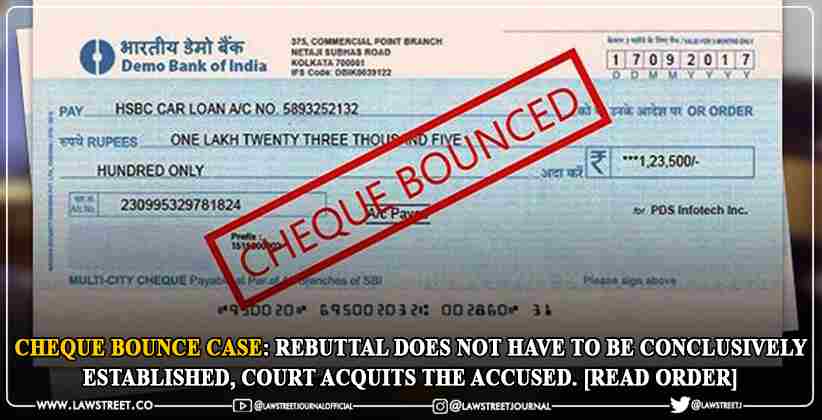In a recently registered case under Section 138 of the Negotiable Instruments Act, 1881, the Court of the Metropolitan Magistrate (at the Karkardooma Courts, Delhi) exonerated the accused on the ground that the complainant had miserably failed to prove the case beyond reasonable doubts. The accused was represented by Ares Law offices.
Brief Facts of the Case:
The complainant, Mahavir Jain, had stated that the accused had approached him for a friendly loan, and the complainant had advanced an amount of Rs. 7 lacs on 19.08.2016 and that it was granted to him. The accused was paying interest on the loan amount regularly until January 2017; however, he defaulted in doing so in July that year.
On being constantly reminded of the payments, the accused finally issued the cheque in question dated 04.09.2018 for an amount of Rs. 7 lacs to dissolve his liability towards the complainant. However, the said cheque was dishonored twice on the ground - Drawer Signature Differ.
The complainant is thus claiming that he has furnished all the above necessary documents and that the signature of the accused is admitted in the cheque in question, and hence the legal liability of the accused stands established.
Contentions of the Accused:
The accused stated that the complainant has alleged that he had advanced an amount of Rs. 7 lacs on 19.08.2016 to the accused as a friendly loan, however, the averments are completely vague, and no reason has been mentioned as to why the accused needed the friendly loan of Rs. 7 lacs.
He has further noted that no oral or documentary proof to show the transaction has been furnished by the complainant and it is not even stated as to how the amount was handed over, whether in cash or otherwise. Similarly, no proof has been submitted to show the payment of any interest up to January 2017 either.
Denying his signature on the said cheques, the accused has further stated that the witnesses to the said receipt are also relatives of the complainant himself and that the complainant did not get the said witnesses examined or lead any other evidence to prove the signature of the accused.
In his claim, the accused has instead noted that he had paid Rs. 3 lacs in advance through RTGS to the complainant against a property deal and a blank signed security cheque in question, but since the deal was not finalized, the cheque in question never got encashed, and instead he has been demanding Rs. 3 lacs from the complainant himself.
Courts Observations:
The Court noted that the defense raised by the accused has been consistent throughout the trial, and he has been able to prove that he has deposited an amount of Rs. 3 lacs in the account of the son of the complainant.
Further, it has been proved by the concerned bank witness that the signature of the accused was changed and updated on 15.09.2016 itself. Thus, the fact that the cheque in question got dishonored on the ground Drawer Signature Differ is consistent with the above defense.
On the basis of the evidence furnished, the case tilts in favor of the accused and the fact that the cheque in question was indeed issued as a blank signed cheque and as security to the complainant in the said property deal. The onus is thus on the complainant to prove the handing over of the amount of Rs. 7 lacs to the accused.
Order of Acquittal:
Absolving the accused, the Court led by Metropolitan Magistrate Preeti Agarwala noted that, I have gone through the entire material on record carefully and have heard the arguments advanced by both the counsels for parties at length. After analyzing the evidence led by the parties, I am of the opinion that the accused has been successful in rebutting the presumptions under the NI Act by raising cogent suspicion in the version of the complainant and on the scale of preponderance of probabilities that the cheques in question may not have been given to the complainant as alleged by him.
The rebuttal does not have to be conclusively established, but such evidence must be adduced before the Court in support of the defense that the Court must either believe the defense to exist or consider its existence to be reasonably probable. In the present case the accused has not only been able to raise a probable defense has also succeeded in shaking the very fabric of the case of the complainant. In the present case, the complainant has miserably failed to prove the case beyond reasonable doubts, she further noted.
Holding that the complainant has failed in proving his case beyond the shadow of reasonable doubts, the Court exonerated the accused of the offense u/s 138 NI Act and acquitted him duly.
(Complainant Case No: 252/2019)









